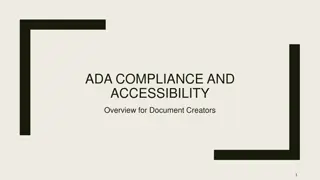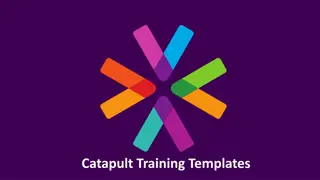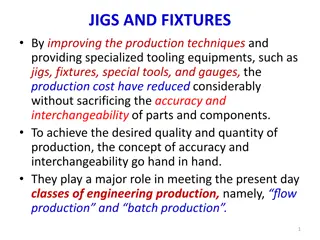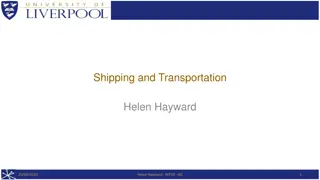Easy Ada Tooling with Libadalang
Explore the functionalities and benefits of using Libadalang for Ada programming, including querying and altering data, incremental error recovery, syntax analysis, semantic tolerance, and more. Discover how this tool enables easy binding generation to multiple languages and ecosystems, facilitating quick and interactive prototyping. Dive into the API features, syntax analysis, semantic outputs, and tree rewriting capabilities provided by Libadalang in an easy-to-understand manner.
Download Presentation

Please find below an Image/Link to download the presentation.
The content on the website is provided AS IS for your information and personal use only. It may not be sold, licensed, or shared on other websites without obtaining consent from the author.If you encounter any issues during the download, it is possible that the publisher has removed the file from their server.
You are allowed to download the files provided on this website for personal or commercial use, subject to the condition that they are used lawfully. All files are the property of their respective owners.
The content on the website is provided AS IS for your information and personal use only. It may not be sold, licensed, or shared on other websites without obtaining consent from the author.
E N D
Presentation Transcript
Easy Ada tooling with Libadalang Rapha l Amiard
Previous episodes - What is libadalang A library that allows users to query/alter data about Ada sources Both low & high level APIs: What is the type of this expression? How many references to this variable? Give me the source location of this token Rename this entity Multi-language: Easy binding generation to other languages/ecosystems Today: Python, Ada, C Easy scripting: Be able to create a prototype quickly & interactively
WRT. ASIS Implementation benefits API benefits Incremental Error recovery Syntax only Semantic tolerance Adapted for long running apps Higher level API Bindings to other languages Tree rewriting Global XREFs
API Part 1: Tokens Code Outputs Token: <Token Procedure u'procedure' at 1:1-1:10> Token: <Token Identifier u'Main' at 1:11-1:15> Token: <Token Is u'is' at 1:16-1:18> Token: <Token Null u'null' at 1:19-1:23> Token: <Token Semicolon u';' at 1:23-1:24> -- procedure Main is null; main.adb ctx = lal.AnalysisContext() unit = ctx.get_from_file('main.adb') for token in unit.root.tokens: print 'Token: {}'.format(token)
API Part 2: Syntax Code Outputs 2:4-2:22 A : Integer := 12; 3:4-3:25 B, C : Integer := 15; -- procedure Main is A : Integer := 12; B, C : Integer := 15; begin A := B + C; end Main; main.adb for o in unit.root.findall(lal.ObjectDecl): print o.sloc_range, o.text
API Part 3: Semantic Outputs Code function Double (I : Integer) return Integer is (I * 2); with Ada.Text_IO; use Ada.Text_IO; procedure Main is function Double (I : Integer) return Integer is (I * 2); function Double (I : Float) return Float is (I * 2.0); begin Put_Line (Integer'Image (Double (12))); end Main; double_call = unit.root.find( lambda n: n.is_a(lal.CallExpr) and n.f_name.text == 'Double' ) print double_call.f_name.p_referenced_decl.text
API Part 4: Tree rewriting (WIP) Outputs Code procedure Main is begin Put_Line ("Hello world"); end Main; procedure Main is begin Put_Line ("Bye world"); end Main; call = unit.root.find(lal.CallExpr) # Find the call diff = ctx.start_rewriting() # Start a rewriting # Get the param of the call param_diff = diff.get_node(call.f_suffix[0]) # Replace the expression of the parameter with a new # node param_diff.f_expr = lal.rewriting.StringLiteral( '"Bye world"' ) diff.apply()
An example checker import sys import libadalang as lal def check_ident(ident): if not ident.text[0].isupper(): print '{}:{}: variable name "{}" should be capitalized'.format( ident.unit.filename, ident.sloc_range.start, ident.text ) ctx = lal.AnalysisContext() for filename in sys.argv[1:]: u = ctx.get_from_file(filename) for d in u.diagnostics: print '{}:{}'.format(filename, d) if u.root: for decl in u.root.findall(lal.ObjectDecl): for ident in decl.f_ids: check_ident(ident)
Syntax based static analyzers def has_same_operands(binop): def same_tokens(left, right): return len(left) == len(right) and all( le.is_equivalent(ri) for le, ri in zip(left, right) ) return same_tokens(list(binop.f_left.tokens), list(binop.f_right.tokens)) Those 20 lines of code found: 1 bug in GNAT 3 bugs in CodePeer 1 bug in GPS def interesting_oper(op): return not op.is_a(lal.OpMult, lal.OpPlus, lal.OpDoubleDot, lal.OpPow, lal.OpConcat)) despite extensive testing and static analysis. for b in unit.root.findall(lal.BinOp): if interesting_oper(b.f_op) and has_same_operands(b): print 'Same operands for {} in {}'.format( b, source_file ) More complex checkers based on the same approach being integrated into Codepeer.
Semantic based static analyzers with Ada.Text_IO; use Ada.Text_IO; Very simple and targeted abstract interpretation DSL to specify new checkers Work in progress! Some of the work is being integrated into Codepeer procedure Main is Input : File_Type; begin Open (File => Input, Mode => In_File, Name => "input.txt"); while not End_Of_File (Input) loop declare Line : String := Get_Line (Input); -- WARNING: File might be closed begin Put_Line (Line); Close (Input); -- WARNING: File might be closed end; end loop; end Main; https://github.com/AdaCore/lal-checkers
Already used in&out of AdaCore This year Next year GNATpp IDEs Up to 10x time faster Error tolerance --syntax-only mode Syntax highlighting Xrefs Completion Microsoft LSP: Support for many editors GNATstub Incremental mode Clients using it already: Code instrumentation Automatic refactorings Generation of serializers/deserializers GNATmetric New metrics
Conclusion Sources are on GitHub Come open issues and create pull requests! First stable version in upcoming release API will be incrementally improved after that We ll try to avoid breakage as much as possible But allow ourselves to make it better for the future :) What do you want to build with Libadalang ? :)

























